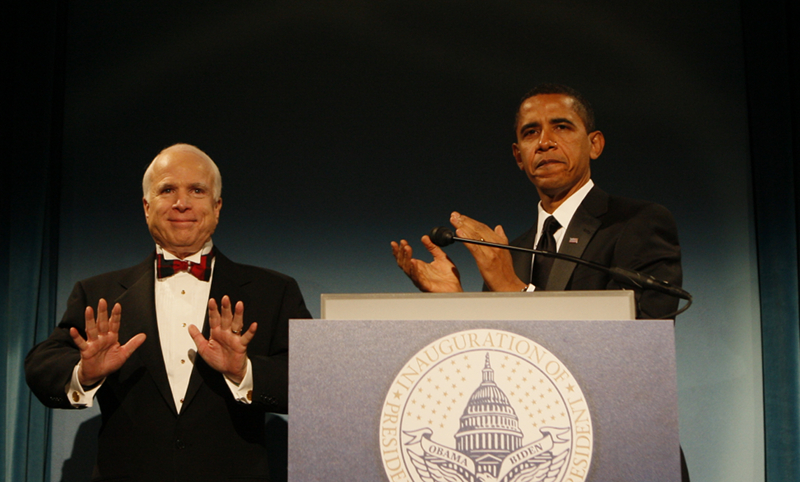The unlikeliest of alliances forged between two once-bitter rivals stands to upend the status quo of congressional gridlock and potentially resolve a bitter partisan chasm that has characterized the modern era of crisis governance.
Yes, President Barack Obama and Sen. John McCain (R-AZ) are essentially working together against GOP leadership and the tea party to break the Senate out of its current situation and resolve major budget rifts that have plagued Washington for years.
McCain has emerged as a kingmaker of sorts in a chamber where various rank-and-file members of the Republican minority have lost their patience with leaders’ strategy of routinely blocking or slowing down legislation and high-profile nominees advanced by Democrats.
Most recently, he played a leading role in securing the confirmation of seven Obama nominees to run important departments and agencies. He was a seminal figure in writing and shepherding immigration reform through the chamber with a large bipartisan majority. He’s broken with nearly all other Republicans in saying his party shouldn’t filibuster Obama’s three nominees to fill vacancies on the D.C. Circuit Court of Appeals. And he’s been actively pushing his members to stop blocking budget negotiations with the House.
Now, as the White House and members of Congress prepare for a potentially ugly battle to keep government open and continue paying its bills this fall, Democratic leaders see McCain as a pivotal figure in their effort to reach a compromise and force tea party conservatives to stop holding routine government funding and debt ceiling bills hostage. Some of them privately joke that he’s the new minority leader.
“Senator McCain is the Senate Republican leadership’s worst nightmare,” said a senior Democratic aide, who wasn’t authorized to speak on the record. “He is very interested in fixing sequestration, he has railed against the tax loopholes, he is clearly not afraid to defy them when he thinks it’s the right thing to do, and he takes 10 Republican members with him. We definitely see him as an important part of the path forward on a budget deal.”
The White House, meanwhile, told Politico recently that its aides talk to McCain about every other day. President Obama, who name-checked McCain when he thanked senators for approving immigration reform and his nominees, gave a nod Wednesday to the efforts the senator has led to ease gridlock.
“The good news is a growing number of Republican senators are looking to join their Democratic counterparts in trying to get things done,” Obama said during a major speech in Galesburg, Ill. aimed at framing the upcoming debates over the budget and debt limit.
McCain’s desire for a budget agreement is motivated by one of his biggest policy priorities: Protecting the Pentagon. The military budget is set to take a major hit due to the across-the-board budget cuts enacted in 2011, and pragmatists like him recognize that the only politically feasible way to undo the so-called sequester is to replace it with a mix of targeted spending cuts and new revenues. That’s a key reason for McCain’s alienation from the tea party, which has blocked a budget accord that includes so much as a penny in new tax revenue.
While talking up one of his legislative proposals this week, McCain again lamented that “our military is being forced to reduce its ability defend against threats to our security because of sequestration.” A number of his GOP colleagues — including Sens. Susan Collins (ME), Lindsey Graham (SC), Kelly Ayotte (NH), Mark Kirk (IL), Lisa Murkowski (AK) and Bob Corker (TN) — share his view that a budget compromise is necessary.
“I think the resolution to the nuclear option crisis shows that, you know, depending on what the issue is, there are groups of people that want to solve problems,” Corker told TPM this week. “So the next issue now is the [continuing resolution] and budgetary issues, and hopefully there’ll be a way to create a consensus as to how to deal with this.”
If McCain can lead enough Republican senators to partner with Democrats on a budget agreement that includes new revenues, it would put greater pressure on the House GOP — whose budget strategy appears to be falling apart — to ease their blockade of a compromise. Even some conservative senators are showing willingness to support that.
“I’d like to see us get a so-called grand bargain,” Sen. Jeff Flake (R-AZ) told TPM. He said he’d back a budget deal with revenues if it includes significant spending and entitlement cuts. “That’s the only way to deal with additional revenues — to have significant entitlement reforms.”
The upshot of such an agreement, if it materializes, is that it would bridge a massive partisan gap about core moral and legislative priorities that catalyzed the slew of near-government shutdowns and near-defaults since Republicans won the 2010 midterm elections.
McCain’s new posture is a radical departure from his ferocious attacks on President Obama after his 2008 defeat, and the rightward lurch on a variety of issues leading up to his reelection in 2010. In one example of their bitter post-election rivalry, McCain ran an ad accusing Obama of “leading an extreme left-wing crusade to bankrupt America” and boasted that “I stand in his way every day.” At a White House summit the following month, Obama chided McCain by saying, “We’re not campaigning anymore. The election is over.”
Those days are long gone. Today, the two share common goals, and McCain may hold the key to ending the practice of Congress heaving from crisis to crisis as the U.S. government’s very ability to address important fiscal problems hangs in the balance. And his relationship with the Democratic leaders who share his goal appears to be stronger than ever.
“Sen. McCain and I must have talked 30 times this weekend,” said Sen. Chuck Schumer (D-NY) after the nominations crisis was resolved. “I was on my bicycle leading a bike ride at the DSCC and I was on the phone with Sen. McCain in Martha’s Vineyard.”










